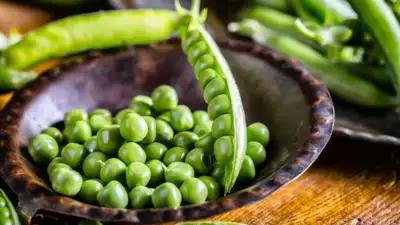
Protein is a necessary ingredient for immune system function, muscle regeneration, and general health, so switching to a plant-based diet doesn’t mean you have to give it up. Many veggies are surprisingly high in protein and can be easily included in your meals, even though meat and dairy are prominent protein sources. These plant-based alternatives are a great option for anyone trying to keep up a healthy, balanced diet because they include protein along with a number of vitamins, minerals, and fiber. Mentioned below are 5 high-protein veggies that can improve your plant-based diet and sustain your health and vitality levels all day long.
1. Brussels sprouts
Despite being frequently disregarded, Brussels sprouts are a fantastic supplement to a plant-based diet, providing roughly 3 grams of protein per cup when cooked. They are also a good source of antioxidants and vitamins C and K. Brussels sprouts are a protein-rich side dish that taste better when roasted or sautéed with a little olive oil, garlic, and your preferred seasonings.
2. Spinach
Although spinach is frequently commended for having a high iron level, each cooked cup of spinach also contains roughly 5 grams of protein. Spinach is a great source of protein, antioxidants, folate, and vitamins A and K. Spinach can be sautéed as a side dish or added to soups, pasta dishes, and smoothies.
3. Broccoli
According to Dr. Preeti Nagar, dietician, Noida International Institute of Medical Sciences College and Hospital, “When cooked, broccoli provides around 4 grams of protein per cup, making it a nutritious powerhouse. It also contains a lot of calcium, vitamin C, and fiber. It’s a great addition to casseroles, stir fries, or as a side dish because of its crunchy texture. Combine it with a healthy fat source, such as avocado or olive oil, for optimal protein absorption.”
4. Peas
With roughly 9 grams per cup, green peas are a great source of protein. They have a mellow, sweet flavor that goes well with practically any meal, and they are also high in fiber, vitamins A, C, and K. Peas are a simple and high-protein way to add protein to soups, salads, or grain bowls.
5. Lentils
According to Simrat Kathuria, CEO and head dietitian, The Diet Xperts, “Lentils are officially a legume, but because of their versatility, they are frequently used in plant-based veggie recipes. About 18 grams of protein, as well as a plethora of fiber, iron, and folate, can be found in one cup of cooked lentils. You may use lentils in salads, soups, stews, and even veggie burgers.”
How to increase your protein intake if you are a vegetarian!













.jpg&c=0&w=700)










































